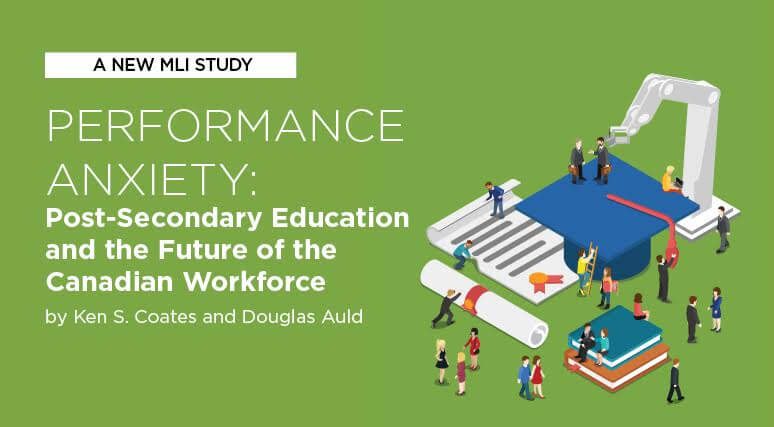 OTTAWA, ON (May 31, 2018): Canada’s federal government has placed fundamental importance on giving young Canadians the skills they need to succeed in the 21 st century global economy. This means that the nation’s future rests on the effectiveness of a loosely connected and multi-dimensional post-secondary system. Are Canadian universities, colleges, and polytechnics collectively up to the challenge?
OTTAWA, ON (May 31, 2018): Canada’s federal government has placed fundamental importance on giving young Canadians the skills they need to succeed in the 21 st century global economy. This means that the nation’s future rests on the effectiveness of a loosely connected and multi-dimensional post-secondary system. Are Canadian universities, colleges, and polytechnics collectively up to the challenge?
A new MLI report, titled “Performance Anxiety: Post-Secondary Education and the Future of the Canadian Workforce,” accepts that there is much to celebrate about Canada’s post-secondary education (PSE) system. However, as professors Ken Coates and Douglas Auld conclude in this report, a greater effort must be made to ensure that post-secondary education meets the future needs of students, parents and employers.
“In an era of employment uncertainty, attention has understandably focused on Canada’s post-secondary system,” says Coates. “Students and their parents want assurances that the college, polytechnic or university studies will lead to good, high-paying jobs. The pressure is on.”
To read the paper, the first of a two-part series, click here.
First the good news. The country’s top universities, all publicly funded, are highly ranked internationally. And a network of institutions have developed collaborative or coordinated programs, bringing the elements of a liberal education together with practical and technical learning. The Canadian post-secondary system is also remarkably inclusive and accessible, providing academic support for weak students and financial support for disadvantaged ones.
Here are the challenges. Some institutions have large numbers of students requiring basic remedial education and exceptionally high dropout rates. A growing number of institutions survive by attracting large numbers of international students, many of whom have trouble adapting to academic life in Canada. Their graduation rates are typically low.
It is also fair to say that businesses are not uniformly impressed with the quality of hired graduates. And claims about the earnings of graduates are overstated. Program choice varies outcomes dramatically, as do socioeconomic factors and work habits. Many fine arts graduate will make less over a career than the typical high school graduate.
Most importantly, there is a substantial mismatch between the skills students are acquiring and the needs of employers. Many students are selecting programs without much thought to employability and many institutions continue to offer degrees and diplomas without much job potential.
Within this context, this paper makes several recommendations to better align Canada’s PSE system with the task of creating the highly skilled workforce of the future, including:
- PSE institutions need to review their classes and programs to determine the degree to which they prepare students for available jobs and, outside the students’ course work, provide students with practical advice on gaining access to jobs.
- Canada needs a robust, time-sensitive system for identifying jobs, employment rates and other work-related data. The system lags so far beyond current realities as to provide little relevant real-time information and even less evidence of pending changes in the employment market.
- Students require accurate and up-to-date information on the employment outcomes from college, polytechnic and university programs. This information should relate study programs to work and career outcomes.
- But employers can’t shoulder all of the cost of embedded programs for students. Instead, K-12 and PSE institutions should look at providing student-run and staffed commercial and administrative activities within their operations.
- The country’s institutions need to shift more rapidly from credentials to competencies. If, as appears possible, credentials are less essential for jobs, it is vital that institutions provide proper evidence of the individual’s competence in desired skill sets.
- The country needs more inter-regional mobility to encourage students to relocate to institutions where there are study slots available and where training opportunities align with job opportunities.
- Canada needs a jobs strategy that focuses on the emerging technology-driven economy and business and sector creation. A collaboration of the private sector, government agencies and PSE institutions is required.
The second publication in this series will provide an examination of quality assurance measures of Canadian post-secondary institutions, focusing primarily on the situation in Ontario, and considers how institutions and governments monitor and evaluate the complex and difficult interplay of government and family investment, the job market, and national economic growth.
***
Ken S. Coates is a Munk Senior Fellow at the Macdonald-Laurier Institute and Canada Research Chair in Regional Innovation in the Johnson-Shoyama Graduate School of Public Policy at the University of Saskatchewan. He is the author and co-author of numerous books including Campus Confidential: 100 startling things you didn’t know about Canadian universities and What to Consider When You’re Considering University.
Douglas Auld is an adjunct professor in the department of Economics and Finance at the University of Guelph. He chaired the University of Guelph Senate Committee on Academic Priorities and has served as president and chief executive officer of Loyalist College and Vice President of the college system Committee of Presidents
The Macdonald-Laurier Institute is the leading independent federal public policy think tank in Ottawa.
For more information please contact:
David Watson
MLI Managing Editor and Communications Director
613.482.8237 x103
david.watson@macdonaldlaurier.ca




